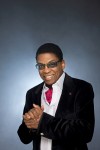Herbie Hancock is a well-known jazz musician, philanthropist and, since fall 2012, professor at UCLA in the Thelonious Monk Institute of Jazz. Hancock is not only recognized for his jazz musician status but also for his collaborations on his album “The Imagine Project” and with artists such as Stevie Wonder. He is also a devout Buddhist, goodwill ambassador for UNESCO and Grammy Award-winner for Album of the Year in 2008 for his jazz album “River: The Joni Letters.” He is only the second jazz artist to ever achieve this award.
Tuesday, Hancock gave his last listening session of a two-part series, which featured his original works, collaborations and talks about his inspirations. Afterward, Daily Bruin’s Anthony Cerrato spoke to Hancock about jazz, life lessons and advice on being a musician.
Daily Bruin: Seeing that you have worked with other musicians on The Imagine Project, who do you most want to collaborate with that you haven’t been able to?
Herbie Hancock: I assume you mean living because there’s a lot of people that passed away that I would have loved to have collaborated with. I had kind of a vague idea that I wanted to somehow collaborate with Paul Bocuse. He’s a famous chef, and (I wanted to) do something with food that was improvised. I haven’t figured out how to actually make that work. So the kind of collaborations I’d be interested in go beyond just collaborations with musicians you know. I mean once you open your vision it doesn’t have to end with musicians.
DB: You mentioned Flying Lotus and Thundercat as two hip-hop artists you have been recently working with during the listening session. Is there something in the works?
HH: Yeah we actually got together already, and we plan to get together again to do something together. I don’t really have anything etched in stone as to what the music is going to be yet but anyway the door is open for those kinds of collaborations.
DB: You are often referred to as a “Godfather” of hip-hop for your hit “Rockit” with Grandmaster D.ST in the 80s. How do you feel jazz has progressed with hip-hop?
HH: There have been some really cool things, Roy Hargrove has done some stuff and other artists have created music that is a collaboration with hip-hop and jazz. I just like the idea of when you take one ingredient then a different kind of ingredient and you put them together and you can create a product or result that couldn’t be done by one by itself, it can only be done by a collaboration (because) collaboration and dialogue are so important.
DB: How does your humanitarianism affect your work?
HH: I used to only perceive myself as a musician. Now I’ve redefined myself as a human being. It makes it very difficult for me to separate different aspects of myself because fundamentally I’m a human being so functioning as goodwill ambassador for UNESCO is (also) an influence, because I have that avenue available. … That’s an encouragement for me to think the way I do now because I have this global framework for the output of ideas as inspiration for this humanitarian vision.
DB: What’s your advice for an up-and-coming musician?
HH: It’s more important for you to develop your humanity as a stepping stone to expanding your life beyond what you may have thought was your world. So that’s crucial, develop your humanity, and we can listen all we want and I think it’s important to listen, to listen to others, to listen to music, to learn to music, but it’s not all about knowledge, and it’s also not all about money. And the most valuable things in life and the things that will most likely make you ultimately happy are things you can’t buy. Courage, wisdom, trust, confidence. Those kinds of things, those are the priceless jewels of life.
DB: What’s the last song you listened to that wasn’t your own?
HH: I don’t remember because last night I watched a movie that Wayne Shorter gave me. I’m not the kind of musician who walks around listening to music all the time so I mean it’s hard for me to answer that question because I don’t have my head buried in music and I don’t want to. I get ideas from living, and being a human being.
Email Cerrato at acerrato@media.ucla.edu.
